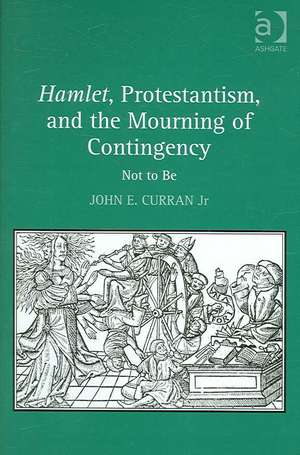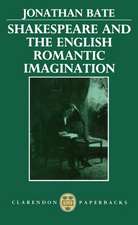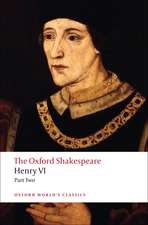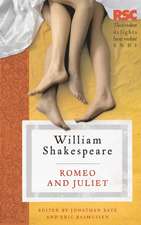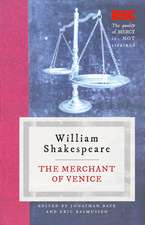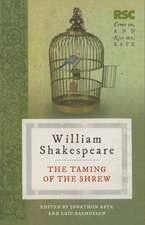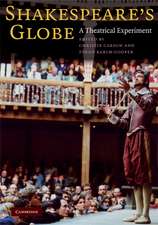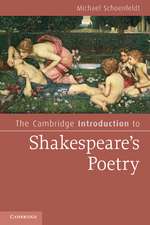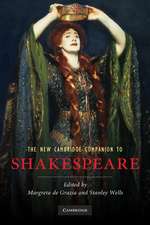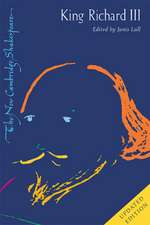Hamlet, Protestantism, and the Mourning of Contingency: Not to Be
Autor John E. Curran Jren Limba Engleză Hardback – 28 oct 2006
Preț: 821.53 lei
Preț vechi: 1103.72 lei
-26% Nou
Puncte Express: 1232
Preț estimativ în valută:
157.20€ • 164.57$ • 130.07£
157.20€ • 164.57$ • 130.07£
Carte tipărită la comandă
Livrare economică 07-21 aprilie
Preluare comenzi: 021 569.72.76
Specificații
ISBN-13: 9780754654360
ISBN-10: 0754654362
Pagini: 278
Dimensiuni: 156 x 234 mm
Greutate: 0.54 kg
Ediția:1
Editura: Taylor & Francis
Colecția Routledge
Locul publicării:Oxford, United Kingdom
ISBN-10: 0754654362
Pagini: 278
Dimensiuni: 156 x 234 mm
Greutate: 0.54 kg
Ediția:1
Editura: Taylor & Francis
Colecția Routledge
Locul publicării:Oxford, United Kingdom
Recenzii
'It is of some interest that Shakespeare coined the phrase "foregone conclusion." For John Curran argues--ingeniously, learnedly, provocatively, and polemically - and with a truly formidable command of the academical literature - that the spasmodic, paralyzed, and resigned action of the protagonist in "Hamleti" n effect comprises the playwright’s analysis of human agency according to opposed theological positions and authorities - Protestant and Catholic - on the subject of the freedom of the will. ... The great accomplishment of this remarkable book is the implacable derivation of its thesis from detail after detail of the play’s speeches and the script for its action, and the unrelenting re-application of the argument to scene after scene - from protasis to denouement - of the drama’s business and pilgrimage. But the great interest of the book also resides in the extended explanation it provides for our own culture’s ongoing and seemingly inexhaustible fascination with Hamlet’s hag-ridden ministry, insofar as that fascination lies precisely in our perpetual unreadiness - or constitutional inability - to bury the theological dead.' James Nohrnberg, University of Virginia, author of The Analogy of The Faerie Queene ’Of several recent studies of Catholic versus Protestant in Shakespeare [...] Curran's is the most subtle and persuasive...’ Renaissance Quarterly ’This is an important book... written with admirable clarity and wants, with extraordinary urgency, to explore a really big idea. With admirable lucidity and economy, Curran sets out within the first three pages of the text proper his intriguing and provocative argument ...Curran writes quite brilliantly on Hamlet as a quasi-absurdist drama of inevitability, and the book is a compelling, at times even a gripping read, which offers an account of Hamlet which no future critic will be able to disregard.’ Notes and Queries '... none of the advances of this recent critical tren
Notă biografică
John E. Curran Jr is Associate Professor of English at Marquette University, USA. He is also the author of Roman Invasions: The British History, Protestant Anti-Romanism, and The Historical Imagination in England, 1530-1660.
Cuprins
Chapter 1 Bad Dreams; Chapter 2 The Be, the Eucharist, and the Logic of Protestantism; Chapter 3 Purgatory and the Value of Time; Chapter 4 The Theater of Merit; Chapter 5 Chastity and the Strumpet Fortune; Chapter 6 The Be, Protestantism, and Silence;
Descriere
Building on current scholarly interest in the religious dimensions of the play, this study shows how Shakespeare uses Hamlet to comment on the Calvinistic Protestantism predominant around 1600. By considering the play's inner workings against the religious ideas of its time, John Curran explores how Shakespeare portrays in this work a completely deterministic universe in the Calvinist mode, and, Curran argues, exposes the disturbing aspects of Calvinism while mourning the loss of Catholic notions of contingency.
